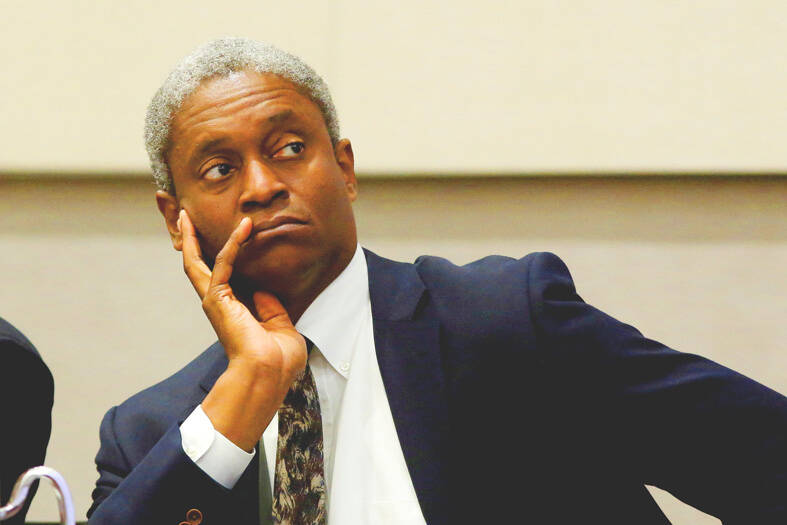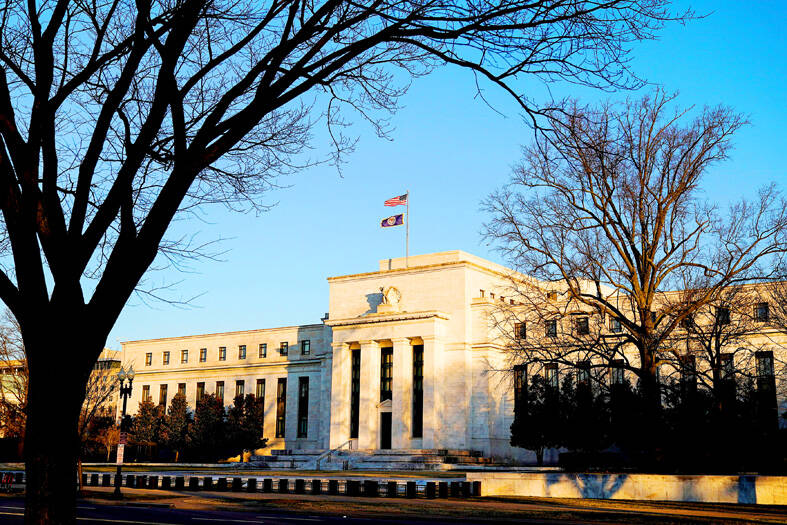US Federal Reserve Bank of Atlanta President Raphael Bostic said he favors slowing the pace of interest rate increases, with no more than 1 percentage point more of hikes, to try to ensure the US economy has a soft landing.
“If the economy proceeds as I expect, I believe that 75 to 100 basis points of additional tightening will be warranted,” Bostic said in prepared remarks for a speech in Fort Lauderdale, Florida, on Saturday. “It’s clear that more is needed, and I believe this level of the policy rate will be sufficient to rein in inflation over a reasonable time horizon.”
Bostic’s plan would shift away from 75 basis-point hikes and continue to raise rates to as much as 4.75 to 5 percent over the next several meetings, which he described as a “moderately restrictive landing rate.”

Photo: Reuters
The Fed should go on hold for an extended period to continue to put downward pressure on prices, he said.
Fed officials lifted interest rates by 75 basis points for the fourth straight time on Nov. 2, bringing the target on the benchmark rate to a range of 3.75 to 4 percent.
Several policymakers have signaled they might consider a 50 basis-point increase when they meet in the middle of next month, depending on what happens with the economy.

Photo: Reuters
“In terms of pacing, assuming the economy evolves as I expect in the coming weeks, I would be comfortable starting the move away from 75 basis-point increases at the next meeting,” Bostic told the Southern Economic Association’s annual meeting.
Bostic’s view of about 4.75 to 5 percent as a peak rate is less aggressive than some of his more hawkish colleagues.
St Louis Fed President James Bullard on Thursday called for rates of at least 5 to 5.25 percent.
While Bostic repeated that there are “glimmers of hope” that supply disruptions are easing, he said inflation was a “mixed bag” and there was still more work needed to battle price pressures.
“My baseline outlook is that the macroeconomy will be strong enough that we can tighten policy to that point without causing undue dislocation in output and employment,” Bostic said.
“I do not think we should continue raising rates until the inflation level has gotten down to 2 percent. Because of the lag dynamics I discussed earlier, this would guarantee an overshoot and a deep recession,” he said.
Bostic said once policy reaches a sufficiently restrictive level, he envisions a lengthy pause in rates rather than a quick reversal, to ensure that inflation did not revive in a way similar to the experience of the 1970s.
He called for policymakers to “remain purposeful and resolute” until inflation was brought down.

MULTIFACETED: A task force has analyzed possible scenarios and created responses to assist domestic industries in dealing with US tariffs, the economics minister said The Executive Yuan is tomorrow to announce countermeasures to US President Donald Trump’s planned reciprocal tariffs, although the details of the plan would not be made public until Monday next week, Minister of Economic Affairs J.W. Kuo (郭智輝) said yesterday. The Cabinet established an economic and trade task force in November last year to deal with US trade and tariff related issues, Kuo told reporters outside the legislature in Taipei. The task force has been analyzing and evaluating all kinds of scenarios to identify suitable responses and determine how best to assist domestic industries in managing the effects of Trump’s tariffs, he

TIGHT-LIPPED: UMC said it had no merger plans at the moment, after Nikkei Asia reported that the firm and GlobalFoundries were considering restarting merger talks United Microelectronics Corp (UMC, 聯電), the world’s No. 4 contract chipmaker, yesterday launched a new US$5 billion 12-inch chip factory in Singapore as part of its latest effort to diversify its manufacturing footprint amid growing geopolitical risks. The new factory, adjacent to UMC’s existing Singapore fab in the Pasir Res Wafer Fab Park, is scheduled to enter volume production next year, utilizing mature 22-nanometer and 28-nanometer process technologies, UMC said in a statement. The company plans to invest US$5 billion during the first phase of the new fab, which would have an installed capacity of 30,000 12-inch wafers per month, it said. The

Taiwan’s official purchasing managers’ index (PMI) last month rose 0.2 percentage points to 54.2, in a second consecutive month of expansion, thanks to front-loading demand intended to avoid potential US tariff hikes, the Chung-Hua Institution for Economic Research (CIER, 中華經濟研究院) said yesterday. While short-term demand appeared robust, uncertainties rose due to US President Donald Trump’s unpredictable trade policy, CIER president Lien Hsien-ming (連賢明) told a news conference in Taipei. Taiwan’s economy this year would be characterized by high-level fluctuations and the volatility would be wilder than most expect, Lien said Demand for electronics, particularly semiconductors, continues to benefit from US technology giants’ effort

‘SWASTICAR’: Tesla CEO Elon Musk’s close association with Donald Trump has prompted opponents to brand him a ‘Nazi’ and resulted in a dramatic drop in sales Demonstrators descended on Tesla Inc dealerships across the US, and in Europe and Canada on Saturday to protest company chief Elon Musk, who has amassed extraordinary power as a top adviser to US President Donald Trump. Waving signs with messages such as “Musk is stealing our money” and “Reclaim our country,” the protests largely took place peacefully following fiery episodes of vandalism on Tesla vehicles, dealerships and other facilities in recent weeks that US officials have denounced as terrorism. Hundreds rallied on Saturday outside the Tesla dealership in Manhattan. Some blasted Musk, the world’s richest man, while others demanded the shuttering of his